Related Research Articles
Friedrich Goldmann was a German composer and conductor.
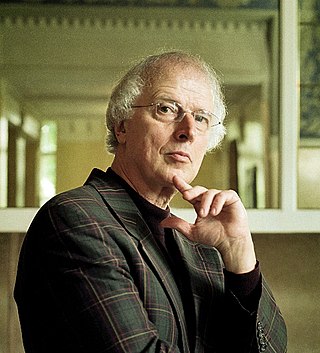
Udo Zimmermann was a German composer, musicologist, opera director, and conductor. He worked as a professor of composition, founded a centre for contemporary music in Dresden, and was director of the Leipzig Opera and the Deutsche Oper Berlin. He directed a contemporary music series for the Bayerischer Rundfunk and a European centre of the arts in Hellerau. His operas, especially Weiße Rose, on a topic he set to music twice, have been performed internationally, and recorded.
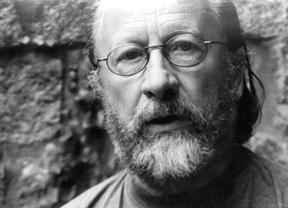
Georg Katzer was a German composer and teacher. The last master student of Hanns Eisler, he composed music in many genres, including works for the stage. Katzer was one of the pioneers of electronic new music in the German Democratic Republic and the founder of the first electronic-music studio in the GDR. He held leading positions in music organisations, first in the East, then in the united Germany, and received many awards, including the Art Prize of the German Democratic Republic, the National Prize of the German Democratic Republic, the Order of Merit of the Federal Republic of Germany, and the German Music Authors' Prize.

Günter Kochan was a German composer. He studied with Boris Blacher and was a master student for composition with Hanns Eisler. From 1967 until his retirement in 1991, he worked as professor for musical composition at the Hochschule für Musik "Hanns Eisler". He taught master classes in composition at the Academy of Music and the Academy of Arts, Berlin. He was also secretary of the Music Section of the Academy of Arts from 1972 to 1974 and vice-president of the Association of Composers and Musicologists of the GDR from 1977 to 1982. Kochan is one of eleven laureates to have been awarded the National Prize of the GDR four times. In addition, he received composition prizes in the US and Eastern Europe. He became internationally known in particular for his Symphonies as well as the cantata Die Asche von Birkenau (1965) and his Music for Orchestra No. 2 (1987). His versatile oeuvre included orchestral works, chamber music, choral works, mass songs and film music and is situated between socialist realism and avant-garde.
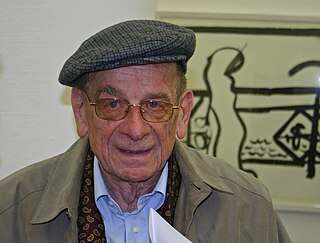
Dieter Goltzsche is a German painter and graphic designer. He won the Hans-Theo-Richter-Preis of the Sächsische Akademie der Künste in 2010.
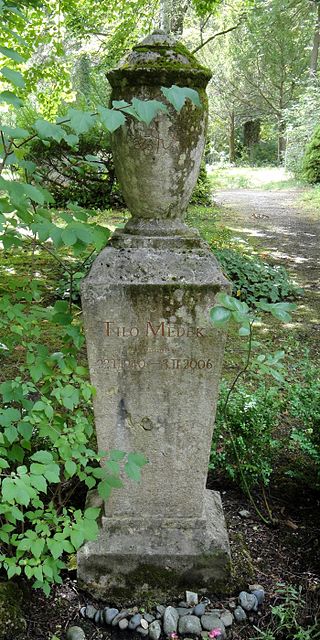
Tilo Medek, originally Müller-Medek, was a German classical composer, musicologist and music publisher. He grew up in East Germany, but was inspired by the Darmstädter Ferienkurse. He composed radio plays and incidental music. His setting of Lenin's Decree on Peace led to restrictions, and after he showed solidarity with the expatriated Wolf Biermann, he also had to move to the West, where he composed an opera Katharina Blum based on Heinrich Böll's novel, and worked in education. He received international awards from 1967 onwards.
Jörg Herchet is a German composer.

Roswitha Trexler is a German operatic soprano and mezzo-soprano who became internationally known especially as an interpreter of the music of Hans Eisler and for her commitment to avantgarde vocal music.
Wilfried Krätzschmar is a German composer.
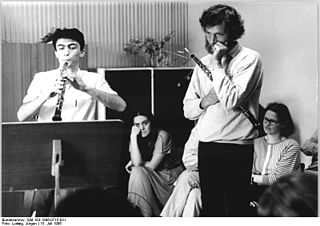
Burkhard Glaetzner is a German oboe virtuoso und conductor. He is one of the leading oboe players in Germany.
Karl Ottomar Treibmann was a German composer and music educator. From 1981 until his retirement in 2001, he was professor of music theory and Tonsatz at the Leipzig University. He was one of the representatives of modernity in the German Democratic Republic, whose great major works can be found in the areas of opera, symphony and chamber music.
Siegfried Thiele is a German composer. From 1990 to 1997 he was rector of the University of Music and Theatre Leipzig.

Friedrich Schenker was a German avant-garde composer and trombone player.

Ulrike Liedtke is a German musicologist and politician (SPD). From 1991 to 2014 she was founding director of the Musikakademie Rheinsberg. Since 2014 she has been a member of the Landtag of Brandenburg. After her re-election in 2019 she was elected President of the Landtag.
Walter Thomas Heyn is a German guitarist, composer and music producer.
Lothar Voigtländer is a German composer.
Günter Neubert was a German composer and tonmeister.
Paul-Heinz Dittrich was a German composer and academic teacher. Based in East Berlin, he focused on chamber music, with many works inspired by poetry. His works were performed earlier in the West than in the East. He was an influential composer of contemporary classical music in Germany who taught internationally, including in the United States, Israel, and Korea.
Werner Felix was a German music historian and Bach scholar. He was rector of the Hochschule für Musik Franz Liszt, Weimar and the University of Music and Theatre Leipzig as well as president of the Chopin-Gesellschaft of the DDR.
Peter Herrmann was a German composer and academic teacher. He composed three operas and a ballet, but mainly instrumental music both for orchestra and chamber music. His works have been performed internationally; his second string quartet was awarded a prize at the Prague Spring International Music Festival. He was professor of composition at the Musikhochschule Leipzig from 1969, serving as its rector from 1984 to 1987.
References
- ↑ Christfried Schmidt bei RICORDI
- ↑ Christfried Schmidt Archived 28 March 2016 at the Wayback Machine beim Kunstberg-Berlin.
- ↑ Christfried Schmidt on Munzinger-Archiv
- ↑ Christfried Schmidt Archived 21 March 2013 at the Wayback Machine at the Sächsische Akademie der Künste
- ↑ Christfried Schmidt im Archiv Zeitgenössischer Komponisten der Sächsische Landesbibliothek – Staats- und Universitätsbibliothek Dresden
- ↑ Isabel Herzfeld (18 April 2019). "Christfried Schmidt's "St. Mark Passion" will be premiered". Der Tagesspiegel. Retrieved 15 November 2020.
- ↑ "Sing-Akademie zu Berlin – Konzerte" . Retrieved 15 November 2020.
- ↑ "Komponist Christfried Schmidt – Der eigensinnige Modernist". Deutschlandfunk (in German). Retrieved 15 November 2020.